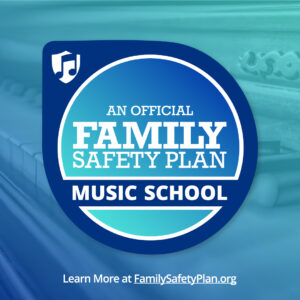Instrument or Instruments
Piano.
Tell us about your formal education in music.
I attended Oberlin Conservatory of Music for my Bachelor’s degree, and the University of Arizona for my Master of Music degree.
Tell us about your professional performance experience.
I have performed in various orchestras and chamber ensembles throughout my career. I have had original compositions commissioned and performed in recitals. I’ve also been in the local music circuit as part of the Silverthread Trio with Allegro’s own Laura Kepner-Adney. And my most recent performance experience was with two special Allegro friends, Devin Gardner and Jenna Orzel.
Do you still practice? How often?
I spend most of my time at the keyboard improvising. I am always working on expanding my tonal vocabulary and improving my technique. I also read a lot of music, and will often spend a day playing through a variety of pieces. I try to play every day.
What inspired you to start playing music?
I grew up in a household of classical music lovers. When I was a young child, I remember a specific occurrence of hearing an orchestral arrangement of Sheep May Safely Graze, by JS Bach, and being struck profoundly–disappearing into the music and at once understanding its grace, humanity, and beatitude.
Was finding the motivation for practicing hard for you as a beginner? Is it still difficult at times?
It was easy for me to find the motivation to play. Working toward a performance or recital however is a difficult task, and requires a different mindset from enjoying improvising or reading. I do find the former to be a challenge to this day, and I am sure will remain so throughout my life.
What advice do have for students who need help getting motivated to practice?
One great way to motivate yourself to practice is to seek out other students and play music with them. Not only are you having fun playing with a friend, but you’re also practicing. This may in turn inspire you to improve your own skills.
As a budding musician, a great deal of your development is spent in a practice area, just you and your instrument. If you want to learn how to play an instrument, read music, improvise, and/or compose, then take the steps necessary to arrive at that goal. Listen to your teacher and practice how they tell you to practice. I mean, really do it. You will see results if you work hard. Sitting down and half-heartedly playing your pieces while watching the clock is no way to learn. Ask yourself: “Do I really want to learn how to play?” If so, you need to dedicate yourself. Music is not easy. History’s great artists worked like no one else. And it doesn’t happen immediately. It takes daily work, mistakes, fifteen minute practice sessions, hour practice sessions, more mistakes, five minutes before XYZ activity, a little before going to sleep. Little by little you gain experience. Over time these small experiences add up to knowledge.
What types of music do you currently listen to and enjoy playing?
I enjoy listening to music that is new. I will sit at the piano and play something I have never played before. That is my favorite thing to hear.
I have a network of musician friends who are always creating. I find their endeavors to be very exciting, whether it is performing the classical canon or coming up with new music, be it rock, jazz, or whatever.
What do you like the most about the Allegro Student Recitals?
The best thing about recitals is that people do them. I love the moment when a student walks on stage and suddenly realizes they have something important to share with others. “Ah, here I am, and I have something to give!” To give is to receive, and this especially holds true with music.
What’s the single most important principle you try to convey to all of your students?
Listen.
What aspect of teaching music do you enjoy the most?
The students. Exploration, accomplishments, joy.
In what ways do you see your students benefiting from learning music?
I see students’ ability to communicate with others improve. I see work ethic improve. I see the ability to take and execute instruction improve. In turn, this will help the student teach others (whether it’s music, or how to tweet from a mobile device).
Music is not only a potent method of communication, it is also an ongoing voyage of self-discovery.
What are your non-musical hobbies and interests?
I am a dog lover, and am raising a really good boy. I play chess, and enjoy nature. I love to watch the world and enjoy its manifestations, whether it’s a NYC subway or a moonlit Arizona night. I also discover a lot of musical inspiration through listening to the world around me. Not so much a fan of portable music players (except on airplanes). I choose to hear birds, trains, squealing brakes, the wind.
What overall advice would you have for all music students, regardless of their instrument?
Music is generous. During the course of learning an instrument, music will soothe, excite, teach, challenge, humble, disconcert, startle, and laugh with you.
But! Only if you breathe your life into it. Music needs us to exist.

